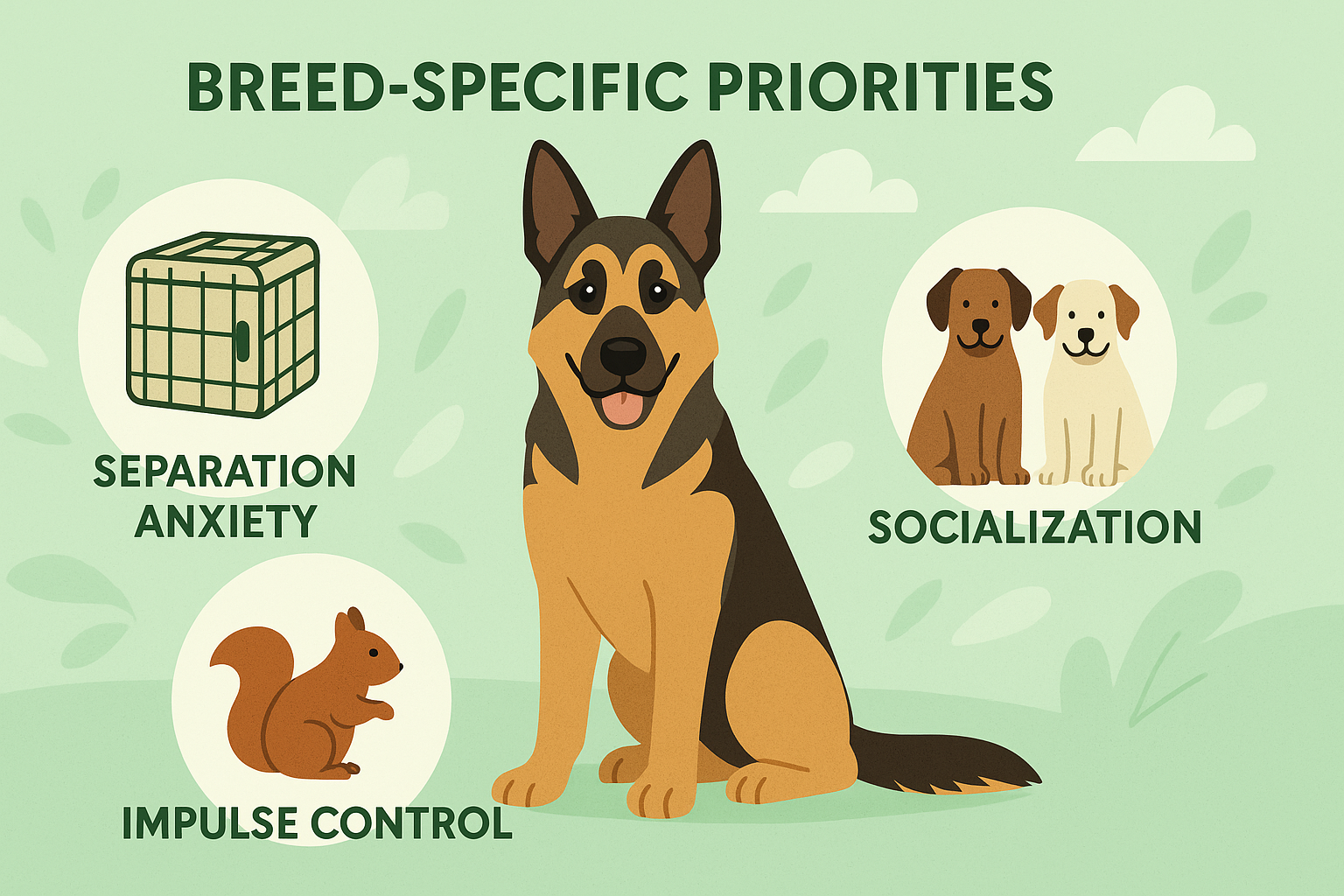Training Your German Shepherd: What Every New Owner Should Know
By Ashley MR · 5 minute read
Last updated: September 10th, 2025

Bringing home a German Shepherd puppy is exciting—but also a big responsibility. These dogs are highly intelligent, loyal, and driven to work, which makes them one of the most trainable breeds. But without the right foundation, their size and strong instincts can quickly become overwhelming.
This guide covers the key training areas every German Shepherd owner should focus on from an early age, along with breed-specific challenges you’ll want to tackle right away.
1. Socialization: Preventing Overprotectiveness
German Shepherds are natural guardians, which means they can become wary or overly protective if not properly socialized. Start early:
Introduce them to strangers (adults and children).
Expose them to different dogs in controlled environments.
Familiarize them with new sounds, places, and situations.
This will help shape them into a confident, balanced dog instead of one that reacts fearfully or aggressively. You can always use our Early Socialization Checklist for more guidance on what to prepare for.
2. Crate Training & Independence: Managing Separation Anxiety
One of the biggest breed-specific issues for German Shepherds is separation anxiety. They bond strongly to their owners and may become destructive when left alone.
Begin crate training early to give them a safe space.
Practice leaving the puppy alone for short periods and gradually increase the time when the puppy begins progressing. This is based on every dog individually.
Provide puzzle toys or chew items to keep their mind engaged while you’re gone, only if not a choking hazard.
Remove all collars before putting the puppy in the kennel, as collars can catch on the wires in the kennel.
3. Impulse Control: Teaching Patience to a Driven Breed
German Shepherds are bred to work and act quickly. Without guidance, this drive can turn into pushy or reactive behavior. Training focus:
Commands like “Wait,” “Leave it,” and “Settle” to teach self-control.
Structured play that reinforces calm behavior before rewards.
Practicing calm greetings instead of jumping or pulling.
4. Leash Manners: Handling a Powerful Dog
German Shepherds grow into strong, muscular adults, so leash manners are a must.
Start leash training as soon as possible.
Reward walking calmly at your side.
Correct pulling early before it becomes a habit.
5. Bite Inhibition & Mouthing
Puppies naturally explore with their mouths, but German Shepherd puppies are especially known for mouthing and nipping.
Redirect to toys consistently.
Avoid rough play that encourages biting.
Reward gentle interactions with people and children.
6. Obedience & Mental Stimulation
Because German Shepherds are working dogs, mental exercise is just as important as physical exercise.
Teach basic obedience early (sit, stay, down, come).
Introduce advanced skills like agility, scent work, or trick training.
Use puzzle feeders and enrichment games to challenge their minds.
7. Recall Training: A Lifesaving Skill
German Shepherds can have a strong prey drive. Teaching a reliable recall early on is critical.
Use games to make coming back fun and rewarding.
Practice in low-distraction areas before progressing to busy environments.
Always reward generously for coming when called.
Quick Recap: Breed-Specific Priorities
Here are the top three things every German Shepherd owner should focus on:
Separation Anxiety – Crate training and independence practice.
Impulse Control – Teaching patience through “Wait” and “Leave it.”
Socialization – Early and ongoing exposure to people, pets, and places.
FAQs About German Shepherd Training
1. How early should I start training my German Shepherd puppy?
Training should begin the moment you bring your puppy home, usually around 8 weeks old. Even simple commands and socialization exercises can start right away.
2. Are German Shepherds difficult to train?
Not at all — they’re one of the most trainable breeds. But because they’re smart and energetic, they need consistent, structured training or they’ll create their own “jobs,” which can lead to bad habits.
3. How much exercise does a German Shepherd need daily?
At least 1–2 hours of combined physical and mental stimulation. Long walks, fetch, training games, or agility are all great ways to keep them balanced.
4. Can German Shepherds live in apartments?
Yes, as long as their exercise and mental stimulation needs are met. Without enough activity, they can become restless or destructive.
5. How do I stop my German Shepherd puppy from biting?
Redirect to toys, avoid rough play, and reward calm, gentle interactions. Consistency is key in teaching bite inhibition.
Final Thoughts
German Shepherds are one of the most loyal and intelligent breeds, but their energy and protective nature mean they need structure and training from the very beginning. With early socialization, consistent obedience work, and plenty of mental stimulation, you’ll raise a well-balanced companion who thrives both at home and out in the world.
Related articles
Any questions? Get in touch!
We are here to support you every step of the way. Our concierge service is here daily to answer your questions!
Chat or speak with our team Mon-Sat 9a-9p ET.





